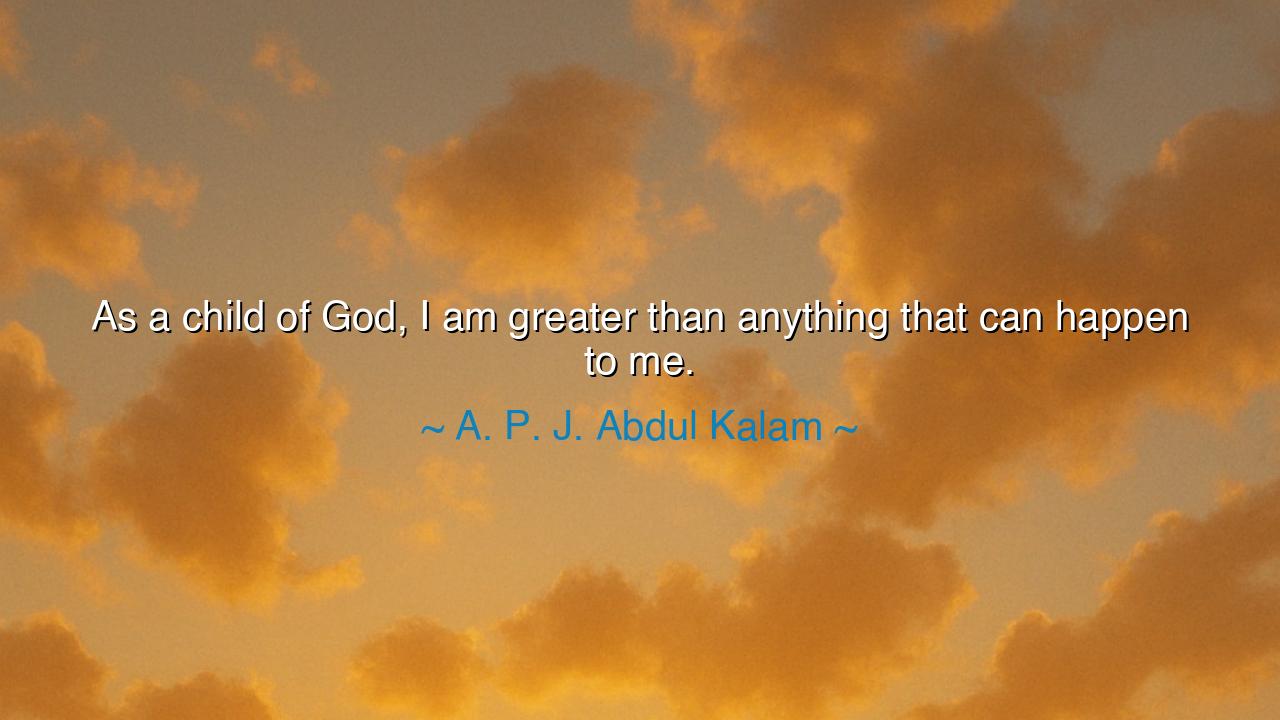
As a child of God, I am greater than anything that can happen to






"As a child of God, I am greater than anything that can happen to me." These words, spoken by A. P. J. Abdul Kalam, the humble scientist and beloved leader of India, are not merely a declaration—they are a hymn of courage, a song of the eternal spirit within man. In them lies the echo of an ancient truth: that the divine spark in the human heart is mightier than all storms that may rage against it. To be a child of God is not to be spared from sorrow, but to stand unshaken in its midst, knowing that within us dwells something greater than any misfortune, any loss, any defeat.
In every age, the wise have taught that man is not a creature of circumstance, but of spirit. The body may falter, the world may crumble, yet the flame of divinity within remains unextinguished. Kalam, who rose from the shores of Rameswaram—a boy selling newspapers beneath the southern sun—to become the President of a great nation, knew well the trials of destiny. His life was no smooth ascent, but a journey through hardship, doubt, and labor. Yet through it all, he held fast to faith—that invisible strength that whispers, “You are not small, for you are born of something infinite.”
There is a quiet majesty in those words: “I am greater than anything that can happen to me.” For they remind us that no event, no tragedy, no judgment of men can touch the eternal essence of who we are. A storm may break the tree, but cannot move the mountain; so too can the trials of life wound the body, but they cannot conquer the soul that is steadfast in its divine origin. This is not pride—it is spiritual sovereignty: the recognition that man, when aligned with the divine, becomes unbreakable.
Consider the story of Nelson Mandela, who spent twenty-seven years behind prison walls. The world might have thought him defeated, his purpose extinguished by iron bars and time. Yet within that narrow cell, he found a boundless freedom—the freedom of the soul that refuses to yield. “I am the master of my fate,” he once read from Invictus; but Kalam’s words go even further, reminding us why such mastery is possible—because within every human being burns the light of the Creator Himself. The man who knows this truth can never be truly imprisoned.
The child of God walks through the valley of shadow yet fears no evil, for he knows his worth is not measured by what happens to him, but by what he becomes through it. The pain of loss refines him; the burden of struggle strengthens him; the darkness only reveals the brilliance of his inner light. Such a one meets adversity not with despair, but with a quiet smile, saying, “This too shall pass—but I shall remain.”
Let this truth sink deep into your heart: you are not a victim of fate, but a vessel of divinity. The storms that shake you are but tests to awaken your power. When the world seems against you, when failures close in and hope fades, remember who you are. You are not defined by your suffering—you are defined by your spirit, which no suffering can destroy. As the gold is purified by fire, so too are you refined by the trials that seek to limit you.
And so, dear listener, walk as a child of God. Stand tall in your struggles, for they are the chisel shaping your greatness. When fear whispers that you are small, answer with faith: “I am of divine origin, and no event can overtake me.” Live with humility, yet with the quiet dignity of one who knows that heaven’s breath dwells within. And each time life strikes you down, rise again—stronger, wiser, and more radiant. For as long as you remember that you are greater than anything that can happen to you, no force on earth or in the heavens can truly defeat you.






AAdministratorAdministrator
Welcome, honored guests. Please leave a comment, we will respond soon